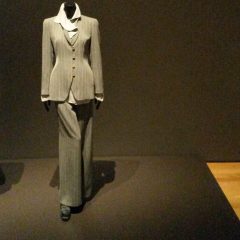It was a Saturday. I visited my father in the care home where he’s living his letztes Kapitel. I took him for a walk in a nearby park. I would repeat this the next day, Sunday. I visit my Dad every Saturday and every Sunday. What I’m about to write here I might write about any of these visits. The exactness of facts, including time, is completely irrelevant to anything going on in relation to my father these days. He is suddenly showing the unmistakable signs of dementia. I’m talking here of a period of mere weeks separating the “before” and the “after”. Well, he’s 96 years old. Why would dementia not catch up with this stubborn man eventually, even if it might have done so less abruptly? Save that the more logical connection is not with age but the various forward falls from his wheelchair smack on his head before he was assigned the reclining wheelchair, now three weeks ago.
In the park we took a couple of different turns than usual. On Saturdays people in this country, rather than visit their old folks and take them for a stroll in a park, tend to amass in the narrow streets of city centers to spend as much money as possible in the shortest time possible on stuff that they look at dejectedly and helplessly after they have carried it inside their homes. Sundays, especially the empty time between late afternoon, when people have completed their second round of weekend shopping, and early evening, when the TV sport broadcasts start, are for things they hate but feel obligated doing, such as paying attention to people who have been craving for it at every other hour of the week. Except when such Sunday is a hot Sunday in summer. Then people in this country tend to gather on the beaches, like walrus, or clog the roads stuffed in their cars all day long in a desperate attempt to get near to one, aggression growing to a point where they would kill a person for pitying them. Then they will not visit their folks even once during the weekend, thinking they have nowhere to go anyway and can easily be held out on another week.
But this was a Saturday, and, people busying themselves aimlessly in the city streets, the park was quiet in spite of the brilliant weather, warm, not hot, the sun prettily veiled, off and on, by just the haziest of clouds. My Dad was enjoying himself tremendously, repeating every other minute or so how agreeable the weather was, and actively looking left and right (as much as the stiffness in his neck would allow him) to take in all of nature’s unobtrusive wonders around us. He even commented on the ice-age boulders bordering the entrance to a restaurant that we ignored as we had no business going there. I felt happy and proud to procure such bliss in my father.
We arrived at a patch of green where a group of young women and a young man, students I gauged, dressed in what looked to me like white karate or judo outfits, were practicing various rolls and breakfall techniques under the supervision of a teacher or trainer. They were at quite a distance from where we were. I thought I recognized my son in the young man. Particularly the impressive head of curly hair (something he has his mother to thank for; if I wash, towel-dry and brush my hair in the afternoon, which I do once every two weeks, I find it still damp on the back of my head on the morning of the next day) and the awkwardness of his rather unathletic movements reminded me of him.
I stopped pushing the wheelchair and started to peer at the group in their white martial arts fatigues, as if riveted by some extraordinary public performance. It was impossible to make out the face of the young man. I turned the wheelchair and I pointed in the direction of the group. My Dad declined to look. He said “You hear the tits?” It took me a few moments to realize he was referring to a species of birds. Then he said, calling me by the pet name he had used for my Mom, who passed away two years ago, still not looking where I was pointing: “No, Doll, that is not our son.”
